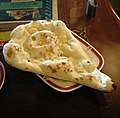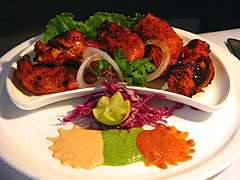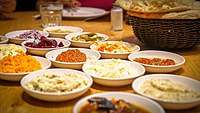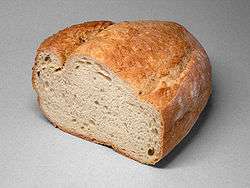Pesaha Appam
Pesaha Appam or Inriyappam or Kurisappam[2] is the unleavened Passover bread made by the Saint Thomas Christians of Kerala, India to be served on night of Maundy Thursday.[2] The white-ish Pesaha appam is a firm rice cake. It is made from rice batter like Palappam,[3] but is different from palappam in that it is not fermented with yeast in its preparation.[4] The meal also includes small banana variants in Kerala such as Poovan Pazham or Njalipoovan Pazham.[2] The brown palkurukku is made mainly using jaggery and coconut milk. A cross is made using the palm leaves from Palm Sunday and placed it on the middle of the batter.[4][5]
.jpg) The Pesaha Appam (Passover unleavened bread) and Pesaha Pal (Passover drink) from Kerala, South India made during Passover by Saint Thomas Christians (Nasranis) | |
| Alternative names | Indariyappam |
|---|---|
| Created by | Jewish diaspora [1] |
| Serving temperature | Served as dinner[2] |
| Main ingredients | Rice batter |
| Variations | Pal appam (fermented bread for festivities and other days), Injera (Ethiopian yeast risen flatbread), lahoh (לחוח) in Yemenite Jewish Cuisine [1] |
| Other information | Cultural cuisine of the Nasrani[1] community and Malabar Jewish[1] community. It is not prepared on any other day except on Passover. The leftovers are to be finished by the next day and any other left over on the third day if at all is to be burned according to the rules in Leviticus. |

Traditionally, Pesaha Appam is served in a ceremonial manner on Passover night in Saint Thomas Christian households. The head of the family cuts the appam, dips it in paalukurukku (syrup) or Pesaha Pal (Passover milk), and serves it to the other family members.[3]
The Pesaha Appam is derived from the ancient bread of Jewish tradition.[6][7][8][9][10][11][12][13] During Passover the bread is prepared without yeast in accordance with the commemoration of Pesaha or Passover in the Old Testament. This unleavened bread is prepared only for Passover and is called as Pesaha Appam or Passover unleavened bread.
Pesaha celebration of Saint Thomas Christians strictly falls on Western Maundy Thursday and lasts only for a single day unlike Jewish passover which lasts for 7-8 days.
Pesaha pal (passover coconut milk [പെസഹാ പാൽ]) is served along with Pesaha Appam on the night of Passover.[12] Some families have the custom of singing traditional Kerala Nasrani Christian songs on passover night.[14] This tradition of Pesaha appam was observed by the entire Nasrani people as well as the Cochin Jews.[12]
See also
- Maundy Thursday
- Passover
- Saint Thomas Christians
- List of Indian breads
References
- Marks, Gil (2010) Encyclopedia of Jewish Food, John Wiley and sons
- "Pesaha of Mar Thoma Nasranis". Nasrani Foundation. Archived from the original on 17 April 2019. Retrieved 17 April 2019.
- Amprayil, Kuruvilla Cherian (16 March 2008). "Kerala Nazranee Pesaha Receipes". Nasrani Syrian Christians Network. Retrieved 22 August 2009.
- "Pesaha Appam and pal, the toast of Holy Thursday". Manorama. Archived from the original on 17 April 2019. Retrieved 17 April 2019.
- "Pesaha Appam". Mathrubhumi. Archived from the original on 17 April 2019. Retrieved 17 April 2019.
- Menachery, G., ed. (1973) The St. Thomas Christian Encyclopedia of India, B. N. K. Press, vol. 2, ISBN 81-87132-06-X, Lib. Cong. Cat. Card. No. 73-905568; B. N. K. Press
- Menachery, G. (ed.) (1982) The St. Thomas Christian Encyclopedia of India, B. N. K. Press, vol. 1;
- Menachery, G. (ed.) (1998) The Indian Church History Classics, Vol. I, The Nazranies, Ollur, 1998. ISBN 81-87133-05-8.
- Podipara, Placid J. (1970) The Thomas Christians. London: Darton, Longman and Todd, 1970. (is a readable and exhaustive study of the St. Thomas Christians.)
- Leslie Brown, (1956) The Indian Christians of St. Thomas. An Account of the Ancient Syrian Church of Malabar, Cambridge: Cambridge University Press, 1956, 1982 (repr.)
- Thomas Puthiakunnel, (1973) "Jewish colonies of India paved the way for St. Thomas", The Saint Thomas Christian Encyclopedia of India, ed. George Menachery, Vol. II. Trichur.
- Koder S. "History of the Jews of Kerala". The St. Thomas Christian Encyclopaedia of Indial ed. G. Menachery, 1973.
- T. K. Velu Pillai, (1940) The Travancore State Manual; 4 volumes; Trivandrum)
- Chummar Choondal (1983) Christian folk songs, Kerala Folklore Academy pp 33-64
External links
![]()




